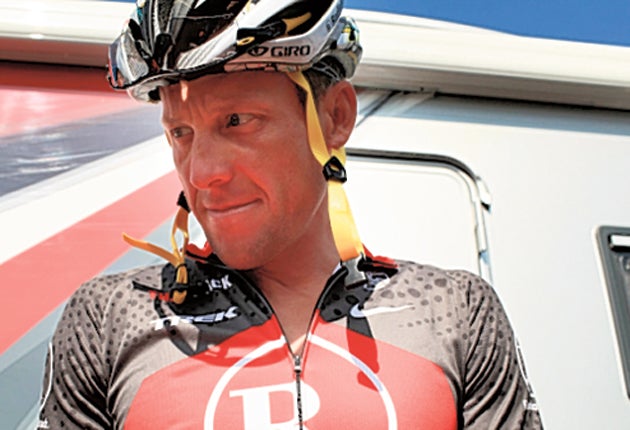Cycling: Fresh doping claims are just 'sour milk' insists Armstrong

Your support helps us to tell the story
From reproductive rights to climate change to Big Tech, The Independent is on the ground when the story is developing. Whether it's investigating the financials of Elon Musk's pro-Trump PAC or producing our latest documentary, 'The A Word', which shines a light on the American women fighting for reproductive rights, we know how important it is to parse out the facts from the messaging.
At such a critical moment in US history, we need reporters on the ground. Your donation allows us to keep sending journalists to speak to both sides of the story.
The Independent is trusted by Americans across the entire political spectrum. And unlike many other quality news outlets, we choose not to lock Americans out of our reporting and analysis with paywalls. We believe quality journalism should be available to everyone, paid for by those who can afford it.
Your support makes all the difference.Lance Armstrong has rejected a fresh series of doping accusations from his former team-mate Floyd Landis relating to alleged drug use within Armstrong's former squad, US Postal. For the second time in 10 weeks, Landis made the allegations in an interview with the Wall Street Journal, published hours before the 38-year-old RadioShack leader rolled down the start ramp of what will be his final Tour.
"The article repeats many of Landis's baseless and already discredited claims," Armstrong argued. "His credibility is like a carton of sour milk; once you take the first sip, you don't have to drink the rest to know it has all gone bad."
In May, Landis accused Armstrong and the team manager, Johan Bruyneel, of organising doping inside US Postal, to which Landis belonged from 2002 to 2004, and his second interview provided a wealth of new detail. Among his claims were that the squad members once had an hour-long blood transfusion in a team bus that conveniently "broke down" on an isolated mountain road.
On another occasion during the 2002 Tour, he claimed, he and three other riders – including Armstrong – had transfusions in a hotel room with plastic taped over the air-condition-ing unit and its smoke detectors ripped out to ensure any hidden cameras were blocked.
Landis also claimed that up to 60 team bikes, made by American company Trek, were sold off to provide cash for the doping programs, and that Armstrong himself gave Landis 20 testosterone patches for the 2002 Tour while having coffee with Armstrong's family. Landis does get some new back-up, but not much. Three other Postal riders told the Wall Street Journal that doping took place, but would not be named.
Evidence of bikes-for-drugs deals is equally blurry. Trek have confirmed team bikes would appear for sale on the internet, but other teams have pointed out to The Independent on Sunday that while the taxman might not hear much about it, it is not unusual for riders to sell off soon-to-be-outdated team material at the end of the season.
While the claims are remarkably detailed and will do nothing to lessen the clouds of suspicion surrounding Armstrong, direct evidence remains scarce.
What is perhaps most telling about the Landis interview and the mindset of riders involved in doping is his expressions of admiration for Armstrong despite claiming time and again that cycling's biggest ever star consistently cheated. "He's got his image, and then he's got the reality," Landis said. "He was the best bicycle racer in the world. I could respect that."
Join our commenting forum
Join thought-provoking conversations, follow other Independent readers and see their replies
Comments